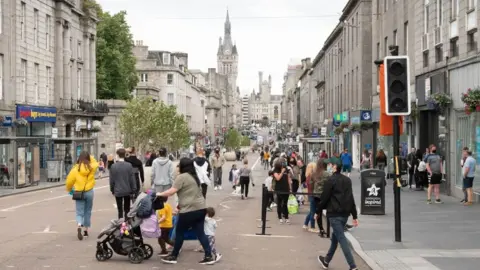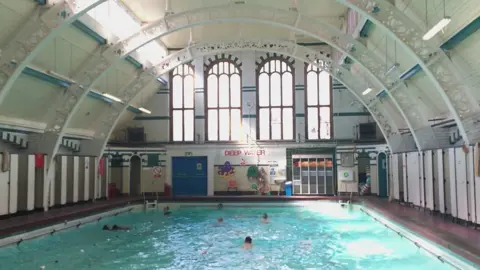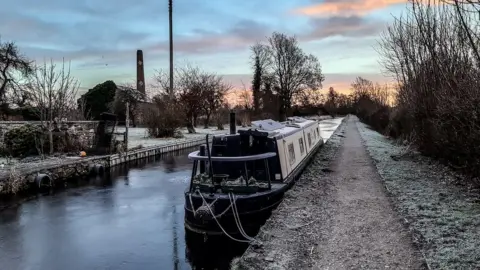Budget 2021: A zoo, a park and a pool - who got levelling up cash?
 Getty Images
Getty ImagesA zoo in Bosworth and a pool in Halifax are among the beneficiaries of the government's levelling up fund.
The £4.8bn pot of money was launched last year and now the Treasury has said which areas were successful in their bids for the first tranche of cash.
Local authorities, with the support of local MPs, could apply for money for regeneration and transport projects.
Newly-appointed levelling-up secretary Michael Gove has said the policy would mean people would see a visible difference in their area.
However, critics of this fund have questioned whether small pots of money for local projects across the UK will transform the economy and create jobs long-term without a country-wide strategy.
Addressing the Conservative conference earlier this month, Mr Gove said "levelling up" was also about long-term economic transformation.
Successful bids for the initial £1.4bn pot of money include:
- £19.9m for Twycross Zoo in Bosworth
- £19.5m for Rotherham town centre
- £20m for Bolton College of Medical Science
- £12.2m for Halifax swimming pool
- £20m for Aberdeen City Centre
- £9.3m to upgrade Whitechapel Road in East London.
 Getty Images
Getty Images
What is levelling up?
Analysis by political correspondent Ione Wells
The government has been under pressure to define what their much-touted policy - "levelling up" - actually means.
We know it's usually used to describe tackling regional inequality - but has at times been a catch-all phrase to promote everything from more money for tennis courts to tackling crime.
The government's new levelling up secretary, Michael Gove, has previously said the first part of it involves people seeing a visible difference in their areas being made more attractive - which the government hopes these pots of cash will start to do.
But he's also said levelling up involves long-term economic transformation and job creation.
Critics of this fund have questioned whether or not small pots for different local projects around the UK - bid for competitively by councils and local MPs - will strategically transform the economy or create jobs long-term.
Though the government would argue other policies, like their cut to the universal credit taper rate and investment in transport links, are more targeting these things.
The fund has also been criticised for not giving devolved governments in Scotland, Wales and Northern Ireland a role in handing out the cash, especially where bids involve funding things like infrastructure that might otherwise be a matter for governments there to make decisions on.
We also don't know who the 'losers' were in this first round of bids, and which areas missed out on cash.

In his Budget speech the chancellor appeared to deliberately address accusations of 'pork-barrel' politics - as bids had to be backed by local MPs and bypassed devolved governments.
Pork barrel politics is term generally used to refer disapprovingly of politicians funnelling money to their own constituents, regardless of need.
However, Mr Sunak specifically referred to the three successful bids in Conservative Stoke-on-Trent seats but also highlighted the successful bids in Ashton under Lyne, Doncaster, South Leicester, Sunderland and West Leeds - which include the seats of Angela Rayner, Ed Miliband, Jonathan Ashworth, Rachel Reeves and Bridget Philipson - all members of Labour's shadow cabinet.
He said: "We are so committed to levelling up that we are even levelling up the opposition front bench."

Responding to the Budget, shadow chancellor Rachel Reeves said the chancellor "gives with one hand but takes so much more with the other".
She accused Mr Sunak and Prime Minister Boris Johnson of operating a "classic con game".
"The prime minister is the front man - distracting people with his wild promises -all the while, his chancellor dips his hand in their pocket.
"It all seems like fun and games until you walk away and realise your purse has been lifted."

Which areas got money?
Analysis by Peter Barnes and Joseph Cassidy, BBC Political Research Unit
The list of successful bids includes 76 in England, 11 in Northern Ireland, 10 in Wales and 8 in Scotland (105 total) with a total value of £1.7bn.
In some instances more than one parliamentary constituency is set to benefit, and in some cases it's hard to judge how the effects will be shared between constituencies.
But BBC analysis suggests the following breakdown by party:
- Conservative-only constituencies: £627m
- Labour-only constituencies: £507m
- SNP-only constituencies: £135m
- Other parties/local authority areas with more than one party: £424m

 Canal and River Trust
Canal and River TrustOver Twitter, Mr Sunak challenged Jonathan Ashworth, the shadow health secretary, to celebrate the news that as part of the fund, £17.6m would go toward improving Leicester railway station.
"Let me know if you want me to retweet," he said.
Mr Ashworth hit back tweeting: "We're still waiting for you to properly compensate our Leicester businesses for forcing a local lockdown on us last year or reverse the increasing numbers of children in poverty across Leicester thanks to your cuts.
"Let me know when that's sorted so I can retweet," he replied.
